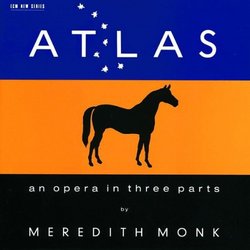An Opera without words . . . and a masterpiece
George Grella | Brooklyn | 05/24/2000
(5 out of 5 stars)
"Monk's "Atlas" is one of the important works of the later 20th century. It is an opera almost entirely without words, and those words in it are spare and enigmatic. Yet, even without the staging on hand, the narrative comes through in the music and the vocalising. Her idea was simple, sincere and quite radical, and beautifully done.The style of the music is very much the Minimalism of Philip Glass, not as complex harmonically, but the same sound world and style. It's very beautiful, and if Minimalist works appeal to you, as well as fascinating experimentation, than you should seek out this great piece."
Strange, wonderful and very human
Paul Carr | Silver Spring, MD United States | 06/05/2000
(4 out of 5 stars)
"Before listening to this work, you'd be well advised unburden youself of all the expectations implied by the words "opera" and "avant garde". It's theatrical, tells a story of sorts, and there's a great deal of singing, but it's very different from the usual notion of opera. The instrumental accompaniment is sparse, and mostly serves to keep time. There are few words, and almost all of them spoken (typical for Monk's work). It's not cold, sterile or academic. That aside, this is a strangely moving and beautiful work that will grow on you. You're unlikely to see it performed live, so this recording may be the only way you'll ever experience it. The extended vocal techniques work to a dramatic purpose, and there is a meaningful musical climax with some stunning ensemble singing. Well worth the price."
Throw out everything you knew before!
Kevin Currie-Knight | Newark, Delaware | 10/05/2002
(4 out of 5 stars)
"As is clear below by the existence of 1 and 5 star reviews only, Meredith Monk is like most 'modern classical' composers. You're either going to love this or hate it. For my part, on first listen, I wasn't sure which category I would fall. First, I must confess that my bias has always been against opera. Composers of opera tend to butcher both the melody and libretto all in the name of an elusive drama that usually falls quite flat. That being said, if you are a fan of traditional opera a la Gluck, Verdi and Wagner, you will never like 'Atlas' which consists mostly of wordless vocalise over repeating patterns played by a 10 peice orchestra. The cast mimics animal noises, claps, screams, shrieks and orrates occasional gibberish.In a strange way however, this is no different than hearing Stravinsky, Babbit or Glass for the first time. It takes a lot of work and, in a sense, we need to re-learn how to listen. Normally, we are used to hearing exposition, development, recapitulation, bel canto and leitmotif. With Monk, we don't get that but instead a continual rich vocal tapestry over magically floating chamber orchestra. Yes, it takes endurance but MAN is it worth it. In fact, 'future quest' (track 4) and 'Agricultural community" (track 10)contains some of the most beautiful vocal writing I've heard in some time. A quick disclaimer about the comparisons below to Philip Glass. Monk's technique, especially in her syncopations and instrumental voicings using 4ths, 5ths and 9ths, I would put 'Atlas' closer to Steve Reich's 'Tehillem' and 'Different Trains.' Still, Monks vocal writing is incomparable and in a crazy way, gorgeous. Pick it up; love it, hate it, sing along if you dare. Just listen to it!!"


 Track Listings (10) - Disc #1
Track Listings (10) - Disc #1